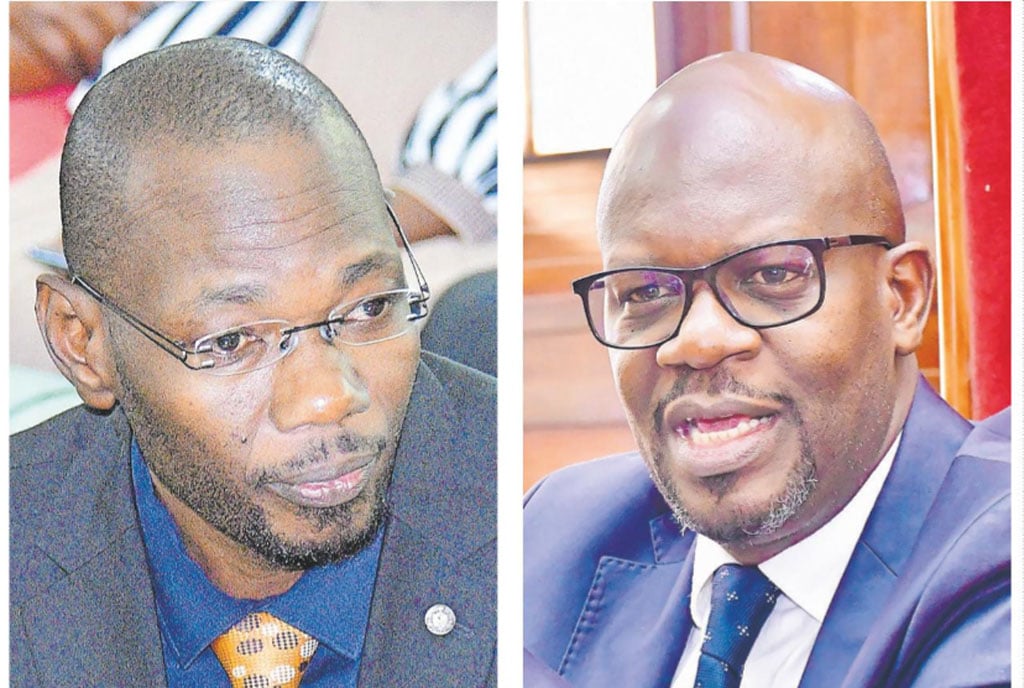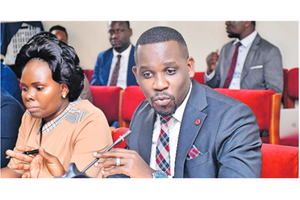
eputy Attorney General Jackson Kafuuzi and Mityana South MP Richard Lumu.
Government, through the Office of the Attorney General (OAG), has moved to pull the plug on a Bill stitched together by a Democratic Party lawmaker that, among others, proposes that the Leader of Opposition in Parliament (LoP) be elected by all Opposition parties in the House.
In his written submission wired to the House committee on Legal and Parliamentary Affairs, Mr Jackson Kafuuzi, the Deputy Attorney General, proffers that the vast bulk of the proposals fronted by Mr Richard Lumu, the Mityana South lawmaker, in the Administration of Parliament (Amendment) Bill, 2024 contravene the position of the Constitution and more.
The Bill has also been red flagged for its potential to impose a charge on the Consolidated Fund if implemented in the current state.
Mr Kafuuzi submitted to the committee that “allowing other Opposition parties to elect the Leader of Opposition would be a contradiction of the mandate given by the people for the Leader of the Opposition to be elected from another party.”
The Deputy Attorney General reasoned that “this is a policy matter rather than a legal matter” since “the selection of the Leader of the Opposition is determined by the internal procedures of the Opposition party, which is a policy matter.”
He also proceeded to note that “allowing the participation of other members of the Opposition parties in the selection of the Leader of Opposition as proposed…would impose a charge on the Consolidated Fund, which is contrary to Article 93 of the Constitution on restriction of financial matters.”
It is on this basis that the Deputy Attorney General’s counsel recommended “that the status quo be maintained.”
Unpopular
Mr Kafuuzi also disclosed that the proposal to have the LoP elected is unpopular in most jurisdictions with a similar legislation system to that of Uganda.
“We have done a comprehensive study on the definition and method of selection of Leader of the Opposition in different jurisdictions and found that almost no jurisdiction in the world has the proposed model of the definition or method of selection of Leader of Opposition,” Mr Kafuuzi’s submission reads in part, citing the jurisdictions of Kenya, Ghana, Zambia, the United Kingdom (UK), India, Australia, Singapore and the United States of America (USA).
Similarly, the OAG opines that Mr Lumu's suggestion to create ground for the removal of the LoP if endorsed in the current state would be in contravention of the Constitution.
“The proposed amendment to prescribe removal of the Leader of the Opposition under the rules of procedure of Parliament interferes with the mandate of the party in opposition to [the] government,” Mr Kafuuzi said.
Costly
It also emerged that Mr Lumu amended his original Bill and suggested that the Opposition side be allowed to have a second member on the Parliamentary Commission. The OAG frowned upon this, reasoning that it would be a waste of taxpayers' money.
“Introducing a second Opposition member among the four commissioners out of the nine members of the commission would distort the principle of numerical strength that lies with the largest party or the government,” Mr Kafuuzi also noted.

Members of Parliament during a plenary session chaired by the Speaker Anita Among at Parliament on July 3, 2024. PHOTO/DAVID LUBOWA
Government also holds that “the proposed amendment imposes a charge on the Consolidated Fund which is contrary to Article 93 (a) (ii) of the Constitution.”
The OAG has also rejected Mr Lumu's proposal to have members of the Shadow Cabinet approved by members of other Opposition political parties in Parliament.
According to Mr Kafuuzi, if this proposed amendment is passed, it would “interfere with the mandate of the party in opposition to government”.
‘Dangerous Bill’
The red flags the OAG has raised align with concerns put forward by various players in Uganda’s political space, including the ruling National Resistance Movement (NRM) party.
Its legal office scoffed at Mr Lumu’s proposals while appearing before the House Committee on Legal and Parliamentary Affairs.
Mr Stephen Baka, the NRM’s director of legal affairs, and his counterpart, Mr Enoch Barata, told the House committee that Mr Lumu’s Bill has the capacity to weaken democracy.
“The spirit of the law is that the party that achieves the biggest number of the popular vote forms a government. It is that same spirit that says that the other party that achieves the next highest vote selects the Leader of the Opposition. So, there is a popular vote to it and you cannot purport to take that away,” Mr Barata told the House committee on October 15.
He added: “So we think that an attempt to then subject the Leader of Opposition to the other political parties in the House would effectively be stripping the other political party of its right and power in some sense.
So that is our position on that. We are inclined to suggest and propose that they remain as it is for that point.”
Two cents of parties
Similarly, Mr Richard Todwong, NRM’s secretary general, insisted that the current status quo be maintained as it provides an independent Opposition sufficient enough to keep the government in check whilst being accountable to the Ugandan population.
Majority of the Opposition parties shared the same sentiments, and roundly rejected the Lumu Bill.
These include the National Unity Platform (NUP), Uganda Peoples Congress (UPC), Forum for Democratic Change (FDC), and the Alliance for National Transformation (ANT).
“The timing and context of the amendment indicates bad faith. It is public knowledge that the current leadership of Parliament has engaged in a pattern of hostility and antagonism against the current Leader of Opposition by creating and sustaining an environment that sidelines and marginalises him in key parliamentary processes and decision,” Mr Lewis Rubongoya, NUP’s secretary general, told the House committee.
The committee has also heard from LoP Joel Ssenyonyi, Opposition chief whip John Baptist Nambeshe, and Mr Yusuf Nsibambi, the FDC (Najjanakumbi) party whip in the House.

Left to right: NUP party secretary general Lewis Rubongoya, party president Robert Kyagulanyi, alias Bobi Wine, Leader of the Opposition in Parliament Mathias Mpuuga, and party spokesperson Joel Ssenyonyi gesture during a media briefing at the party headquarters in Kamwokya, Kampala, on September 21, 2023. PHOTO/MICHAEL KAKUMIRIZI
The House committee is expected to process and table its report after getting feedback from various stakeholders in the country.
It is, however, not clear when this will be lined up on the order paper and hence be proposed for enactment through second and third reading considering that Parliament was adjourned Sine die (indefinitely).
Lumu’s thoughts
Our repeated attempts to sound out Mr Lumu about the OAG’s position were unsuccessful.
However, in an interview with this publication nearly a month ago, the Mityana South lawmaker indicated that his Bill is chiefly purposed to cure what ails the Opposition in the House.
He reasoned that his proposal, once endorsed, would enable Opposition political parties to elect and fully comply with the decisions of their elected LoP, hence creating unity.
“What I am actually bringing in now is democracy itself. I am saying [that] let all Opposition members elect their Leader of Opposition. Isn’t that democracy? I have also heard some people say that this one is going to weaken the Opposition. If they are not crazy, [then] they need to see doctors,” Mr Lumu said in early September.
The Democratic Party lawmaker also dismissed allegations that he had crafted the Bill in bad faith.
“I don’t have friction with people. I have my opinions. I don’t have friction with anybody because if you ask anybody here, I normally mind my business. I don’t care what people are doing. When I come here, I do my job and leave. So I have no friction with whoever,” he also stated at the time.
He added: “And I don’t know why they are trying to create that as a point. Let them discuss my issues. My issues are national issues. They cannot reduce my issues to conflicts with I don’t know who. That is being unrealistic and actually reducing my Bill to a person.”
Rejected
Ms Sarah Bireete, the executive director for Centre for Constitutional Governance (CCG), told Sunday Monitor that she is not surprised that the Bill has met strong resistance from both sides of the political divide. “First of all the Lumu Bill is awkward to the extent that it contravenes the multiparty dispensations of [the] government and Opposition which are determined on the ballot,” she said, adding that the Bill “does not cure anything. It is a violation of all known democratic principles on earth.”
Ms Bireete also contends that the provisions within the changes Mr Lumu attempts to bring forward disempower electorates. “The Lumu Bill attempts to take away the sovereign power of the people to determine who the government-in-waiting is. It is fundamentally wrong and was brought in terms because there is even no precedent anywhere in the world where such things happen,” she noted.
According to Mr Timothy Kalyegira, a veteran journalist and political commentator, the failure of Mr Lumu to attract support from either side of the political aisle is telling. Mr Kalyegira said that “when people like Lumu come out with this kind of Bill, there is all this suspicion that there are forces using him to make [the proposal].”
The repudiation from both the government and Opposition shows, per Mr Kalyegira, that the Lumu Bill is an outlier. Mr Kalyegira added that this also defeats the long-held assumption that the ruling government “uses Baganda [people] against themselves”.

Veteran journalist Timothy Kalyegira.
When asked if this serves to show that the Bill could have been crafted as a diversion from major debates in public domain, Mr Kalyegira said: “It is a wrong suspicion, but it also shows something [different] because [Mr Lumu] got no support.
It then makes him appear to have been acting alone to his idea, independent of the NRM.” He also joined other stakeholders in expressing his doubt about what the Lumu Bill brings to Uganda’s political table. “It does not make sense,” he said.








